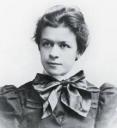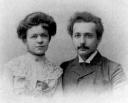Everyone is familiar with the iconic pictures of Einstein as an old man. He has a wild halo of white hair and looks somewhat mad.
As with Darwin, whose iconic photo also shows him as old, bearded, and white-haired, I wonder if such images are intended to replace God in the minds of viewers–as an adjunct to the never-ending debate between science and faith.
More interesting to me are the photographs of the younger Einsteins, the ones we haven’t seen until they have become cliches.




About Nancy Pinard
Professionally-speaking, Nancy Pinard is an author-educator who spends her days writing, teaching, reading, and researching for her writing and teaching. She is the author of two published novels, Shadow Dancing and Butterfly Soup, and numerous short stories. She has taught the craft of fiction writing in many venues including Sinclair Community College, University of Dayton Life-Long Learning Institute, Antioch Writers' Workshop, Mad Anthony Writers' Workshop, and Molasses Pond Writers' Workshop.
Personally, her faith is what sustains, inspires, and motivates her to continue to explore meaning through literature.
"You are right in demanding that an artist approach his work consciously, but you are confusing two concepts: the solution of a problem and the correct formulation of a problem. Only the second is required of the artist." Anton Chekov to Alexei Suvorin, October 27, 1888





Are you defining religion/faith here as Christianity? (A side note: I’m not sure about the assumption that many people image God as an old man with white hair, if they personify Him/Her at all, or feel the need to assign a gender.) If you’re writing about Christianity when you say “religion,” I think that’s a helpful specificity to offer. I don’t think there’s automatically a conflict the realms of the sacred and of science–in fact, some might see them as the same. That does depend entirely on how you define religion, so it will be interesting to see where you go with this as your definitions emerge.
A general note–what a great blog design!
Or is it the tendancy for people to show mature photos of ourselves? My school and college photos are all tucked into an album. It’s the more current ones I display.
Love the photos. It’s exciting and provocative to think about Einstein in the the context of FAMILY.
My favorite Einstein quote is: “A hundred times a day I remind myself that my life depends on the labors of other men, living and dead and that I must exert myself in order to give, in measure as I have received and am still receiving”
Good luck with your gargantuan task!
Most people I know think of God as the movie God with white hair and thundering voice though Jesus, God yet Son, as younger and quite buff in recent decades. I find the old photos fascinating and another piece of understanding them.
And I second Lynne’s comment: your blog design is wonderful.
Far too often we miss the critical influences in the lives of great men and women. In this case I have seen the emerging significance of the people in Einstein’s life, who provided the emotional support he needed. Few of us in life would be successful without the influence and care of many, often hidden, people.
I hesitate to designate “religion” as Christianity since Einstein was Jewish. Interestingly, when Einstein referred to God, he sometimes spoke of him as “the Old Man.”
It is true that the conflict between science and religion is not universally felt. Europe, for example, according to Einstein biographer and friend, Philipp Frank (Einstein: His Life and Times), is much less occupied than America is with integrating the two.
Einstein rejected the idea of a personal God but subscribed to the presence of a thinking mind behind the mathematical organization of the universe. In this respect, he differed from Darwin, who, after daughter Annie’s death, dismissed God entirely, refusing to worship any god who allowed an innocent to suffer as Annie had. His wife Emma’s response was opposite his. She took comfort in her faith.